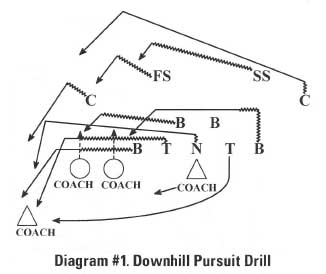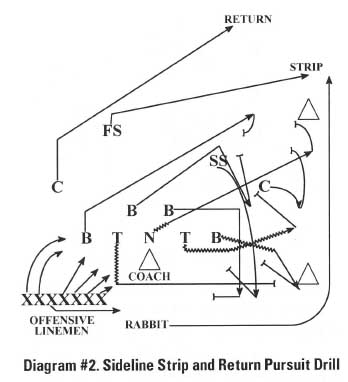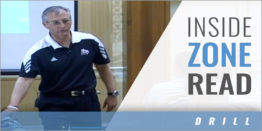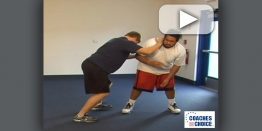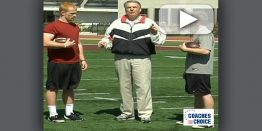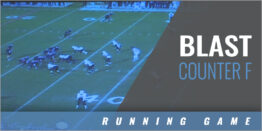|
By: Clint Alexander - Woodberry Forest School, Virginia Originally Published in: 2011 Coach of the Year Clinic Notes - by: Earl Browning This is my 16th year as a head coach, and it seems like I just started. I have been to many clinics and seen numerous amounts of X's and O's in that time. At one time, I felt I did not know enough about running a great practice. Each year, we go to colleges and watch what they do and ask the staffs for tips, hints, and clues about how to practice with a purpose and do a great job. Woodberry Forest School is a private boarding school with about 400 boys in grades 9 through 12. It is an old and very traditional school. 1 started out coaching in a small country school and later went to a large public school with an enrollment of 2,200 students. From there, I came to Woodberry, which was an entirely new environment. It is more like a college rather than a high school as to the way they handle everything. We had to make some changes on the things we did to be successful. Our practices ended at 5:40 on the dot and dinner was at 6:15 sharp. We had to be very efficient with everything we did. I am a big military historian buff, and this statement by Napoleon is our foundation principle: "Morale is to material as three is to one." When Napoleon took over the army in Italy, the Italian army had not won a battle in two years. He defeated Austria with an army that did not have muskets, shoes, or any of the conventional tools for fighting. He made his troops believe they could win. We wanted to do the same thing with our players. We wanted them to believe they could be successful. Empower your coaches. COACHING PHILOSOPHY
We all want to win games because we are competitive. Sometimes, it takes a loss to get your team to build success. The last three years, we have a record of 24-3. Two of the three losses were overtime losses. We have found studying how military leaders overcame adversity is a great way to get better as a coach. You have to empower your coaches. Give people the plan, and turn them loose to execute the play. If you try to micromanage everything, you will slowly but surely destroy their enthusiasm for the job. They will not work as hard, and it becomes the "it is not my idea" syndrome. If it is not their idea, it will not be successful. If your players are doing something you do not like, do not jump on them. Talk to their coach, and change it that way. The more I help the player, the less he listens to his position coach and the more he listens to me. I do not want that to happen. He has to listen to his position coach and do it his way. Everybody says we listen to our players, but I am not sure we do. If you ask them, you have to respect what they say. When our defense comes off the field, the first thing I ask them is, "What are they doing? Is it what we thought they would do? What is not working?" TEAM VALUES You must have a core set of values that you build your program on. This is what you will rely on to solve the problems you will face as a program. You cannot be a rudderless ship. Unselfish If your players value the role they have instead of valuing the role other players have, you have a chance at a great team. When we started here, we had to build on something. They had never won, so we could not build on that foundation. We went back to core values. When we turned this thing around three years ago, we decided we were going to do three things. We were going to be unselfish, disciplined, and leaders. We were not going to talk about anything else. We did not talk about winning, playoffs, ranking, or any of the unimportant things. We had many thoughts on unselfishness. Our players bought into what Coach Krzyzewski said about the players' role on a team. He said to embrace their role and not covet the next player's role. In three years, I have not had a parent call me, complaining about anything going on in the program. It cost $42,000 dollars a year to send their sons to this school. There are no scholarships, but there is financial aid. It goes before a financial aid board, and the fee that comes out of that board is what you pay, or you do not come to Woodberry. The academic standards are astronomical. Leadership Leadership is leaders inducing followers to act for certain goals that represent the values and the motivations, the wants and the needs, the aspirations and expectations, of both leader and followers. The genius of leadership lies in the manner in which leaders see and act on their own and their follower's values and motivations. Leadership is a full-time job. At Woodberry, we have 400 hundred students, which amounts to about eight students to a class. My football players cannot hide in a class. The teachers and students know you play football and see everything you do. You have to be a leader and remember the little things. Discipline Nothing is more harmful to the service than the neglect of discipline; for the discipline, more than numbers gives one's army superiority over another. You must have discipline and take pride in the little things. The one thing we were not taking advantage of at Woodberry was how smart our players were. This is the smartest group of players I have ever coached. If the players ask you something, do not tell them the wrong answer. If you do not know, find out, but do not be wrong. BUILDING A PROGRAM
I started my head coaching career with the greatest job you could have. It was in a small town called Concord, Michigan. There were 329 students, and four seniors played football. I applied for the head job at that school. I waited two months for the interview. I was so excited about getting my first head coaching job. I met the athletic director at one of the local restaurants. He said, "Congratulations, you got the job." I asked him why I did not have to answer any questions about my expectations or about what I believed. He told me I did not need to because I was the only one to apply for the job. I took over that program in 1997. They last had a winning season in 1988. They went 5-4 that season. Since then, there was not a kid in the school who had ever won a game. Our numbers were so small I went to the superintendent and told him if someone were hurt in the first two weeks, we would have to cancel the football season. He told me I could not do that. I went to the band and recruited some bodies. I told them they could still play at halftime of the games. We were close to turning the program in those early years. We won some games and lost many close ones. We were in the game and playing competitively. In the first meeting I had with the players, I told them in five years we would be playing for championships. In four years, we went 10-2, won our district, and one regional. When I came to Woodberry, one of our goals was to be a two-platoon program. Today, we two-platoon at all three levels. We all have special players who play both sides of the ball. That first year at Concord, we went to overtime and lost, but we celebrated. We celebrated because we were close, and that was a little victory for us. I told the players they were the foundation that would lead us to the Silver dome to play in the playoffs. We went 1-9 the first year. That first year at Concord, we went to overtime and lost, but we celebrated. We celebrated because we were close, and that was a little victory for us. I told the players they were the foundation that would lead us to the Silver dome to play in the playoffs. We went 1-9 the first year. The barometer for our program has been the Landon School. They are a great school in Bethesda, Maryland, and do a good job with their players. WHY COMMIT TO A TWO-PLATOON PROGRAM?
This is what we have learned about two-platoon football. The second thing on this list sounds crazy, but we did it. Our thinking was, why take a B player and make him do two different things? Let him do one thing and make him a B+ player. We make our living by taking B players and making them do one thing really, really well. I did this with a small staff, and I am doing it with the staff I now have. I have a great staff of coaches. When you play as many players as we do, it makes your practices better. When we practice, we go fast, and we compete. We can make changes and adjustments to the game plan because I have the defensive players 99 percent of the time. We have 396 boys in our school, and 96 of them are on our varsity roster. I probably have 30 real "football players." We had two boys on our team this year who did not play a down. One of them told me the reason he played was because he did not want to go quietly into the night. He wanted to rage against the night. He had a great experience with us because he said he was a football player. Defensive Philosophy He who defends everything defends nothing.
Every team has that one player who is capable of beating you. We work hard on stopping that from happening. We must pursue the ball. We have a statement about that: "A defensive player's commitment to his teammates can be measured by the distance from the ball at the end of each play." Our Defensive System Be extremely subtle, even to the point of formlessness. Be extremely mysterious, even to the point of soundlessness. Thereby you can be the director of the opponent's fate. That quote describes what we do defensively. The formlessness means like water. If you watch us play defense in five games, you may not see the same defense in any of those films. We do not really have a system. I tell our players we are a 3-4 defense, but we are a 50 front. We may never be in the 50 front based on what the offense does. If we have to be in a 42 defense that week, we play 42. If we have to be in a 33 defense, we will be in that front. We put the players on the field who can win that week. DEFENSIVE SYSTEM
Sometimes, the system of defense does not work with the personnel you have. We have to be adaptable to play at a high level. I love change. If there is an idea, I think will work, we try it. If it does not work, it does not work. However, I do not eliminate things because we have never done it before. When I got to Woodberry, all the levels were doing different things and systems. I had to change that. I told our players the way we were going to play, we would win many games. If we decided not to play with a strong safety this particular week, we have a chance to win the game. We will have a better chance of winning if your parents do not call me all week asking why you are not playing strong safety this week. If I have to spend the entire week defending what we are going to do on the phone, we are not going to win. The team bought into those ideas, and we have not had that problem. Teaching in parts was the biggest change for me. I came from a big public school that worked all summer. We played in the 7-on-7 leagues, and we installed everything we needed for the season. When the season started, we installed everything we were going to use. At Woodberry, we say goodbye on June 21, and they show back up on August 21. Our players go all over the world during their summers. They are involved with exchange programs and all kinds of activities. We have no contact with our players over the summer. When they come back to school, we have to do it all immediately. If we have to create a package or change something, we tag it with something the players know and can remember. We had a player received a scholarship to Johns Hopkins and had to miss a game. He had to accept the scholarship in person. Instead of making a big deal out of his missing the game, we made a celebration out of the award. The next week, we named a package in the defense, Hopkins, and everyone immediately knew what to do. Defensive Musts Maneuver according to circumstance.
Napoleon made that statement to one of his commanders. It simply means that he is not with him, and the commander has to make the best decision possible. That same thing happens in coaching. In the game, things happen quickly, and you must make decisions. Do the best you can. Probably the most important thing I learned in coaching is about halftime adjustments. I used to go to Penn State to their camps and spring practice. I was a big Joe Paterno fan. I asked him one day what he did at halftime. He said, "Don't lose the game." I thought he was blowing me off. He said, "Do not let the coaches go into the locker and rip your team a new one. They will never recover." He told me, "Never go into the locker room without a plan. Get together with the coaches and discuss what is going to happen in the locker room." There was a study done in Alabama by a sport psychologist, comparing the behavior of wolves and dogs to football players. Some coaches want dogs. They want obedient players that do exactly what the coach tells them. Wolves never became domesticated and were more independent than dogs. They make quick decisions, but at the same time are cautious. You have to make up your mind if you want your players to be wolves or dogs. If something happens in a game that we have not worked on, we want the player to make a decision instead of looking to the sidelines for help. If you pull a player out of the game every time he makes a mistake, you do not help him. They are going to make mistakes and get beat. You have to work on his attitude and keep it positive. The first thing we told the defensive backs was if they did not get beat on occasion, they are not playing hard. We want them going after the ball and not afraid of giving up a score. If they are not aggressive, they are passive, and you cannot do that at the defensive back position. Play Great Defense and Special Teams In lies in defense; the possibility of victory in the attack.
DOWNHILL PURSUIT DRILL Keys to the Drill:Sprint! Start with a great huddle and break (Diagram #1).
Coaching Points: The backside safety has the cutback alley. The backside corner has deep pursuit. The backside outside linebacker plays reverse and counter. The inside linebacker slides and stays square until he gets outside the tackle or tight end. Have waiting players go work techniques on the sled until they go. There will be no rest for any players during this drill. Downhill pursuit is critical in creating negative plays and taking away cutback lanes. Everyone does the pursuit drills the same way. I hate those drills because the defense pursues the ball as if it is a long run by the offense. The mentality is we are giving up a 15- to 30-yard run. We want to pursue downhill. We teach a similar drill, but we added a large ball on the outside of the drill to make the defenders fight over that ball to get to the ball carrier. We use this as a conditioning drill. The players not in the drill work on sleds, using the techniques we taught them. They are not standing around and watching. Everyone works on something. We play good defense and get downhill in our pursuit. We fight over blocks and get to the ball. SIDELINE STRIP AND RETURN PURSUIT DRILL Blocking after a turnover can result in a game winning play, and all players contribute (Diagram #2)
We do the traditional sideline pursuit drill with the rabbit, except we use it as a strip and return drill. The last two defenders in the pursuit line make the play. The next-to-last defender strips the ball from the rabbit. The last defender scoops the ball and returns it. The rest of the defensive team becomes blacker for the return players. When we get the ball, we want to score. We have seven offensive linemen who run through a chute down the line of scrimmage and try to touch the fumble returner. They have shields, and the defenders try to block them. These two drills account for about 60 percent of the success we have on defense. We do these drills almost every day. In pre-season camp, we do one in the morning and one in the afternoon. The second drill is hard to do right. Too many things can go wrong in running the drill. DEFENSIVE GAME PLAN
When we do our game plan, all the coaches get a say in what we do. We want our offensive coaches there because sometimes they see things we do not see. We also try to help them on the offensive side of the ball. On Monday, we do the correction from the game and install the adjustment to stop the opponent's favorite play. The two things we have to stop are the tunnel screen and the zone read. You can see the chart as to what we do the rest of the week. When we get into defensive practice planning, we want to balance what we need to improve on with what we need to change to be successful this week. You want to create specific drills to work against your opponent's strengths. Make up your own drills to deal with what you have to do. Practice planning is the most important thing I do as a head coach. The position coaches must carry out the defensive game planning. They have to go through their individual position techniques. We want to work special teams every day-at least some part of it. We have to install the game plan and make our formation adjustments to what we anticipate seeing. We work our pursuit drills and game plan at the same time. We work 1-on-1 with our offensive positions best against the best. On Tuesday, we work specific team drills. We work on the tunnel and wall screen in our 7-on-7 drills. We work the inside drill, and we work a 5-on¬11 drill. We take our five defensive linemen and work against our pass offense. The quarterback and receivers work on their passing game, and the offensive linemen work on their pass blocking against our defensive front. It is actually a better offensive drill than defensive drill. In the drill, the defensive line does all their line stunts against the offensive line. We work off a practice schedule and timer. We do not deviate from the schedule, and we are on time with the horn. We have all the individual, group, and team periods for the day on a strict schedule. If we run the plays as part of our offense that the opponents run, we time and practice those plays against our defense. Both units get work at the same time. An important point for the practice field is working from all parts of the field. Do not spend all your time working from the middle of the field. Move the ball so the linebackers know where their drops are in relationship to the field. If the middle linebacker tilts to run to his hook zone when all he has to do is back up, that needs to be covered. We cover that in a period on our practice schedule. I do not ask the position coaches what they do during their individual periods. They know what they need to do, and they work on that. We work a similar practice schedule as far as time and drills for Monday, Tuesday, and Wednesday. Each day should bring improvement in doing the schedule for that week. Following are examples of what the defensive backs did in those three days:
That is an accumulative time for the defensive backs for Monday, Tuesday, and Wednesday. You can see where we spend the time. We work individual technique because it is fundamental to the game. The scout period is not a wasted period. When he plays on a scout team or position, he works his technique. We break down each of our positions the same way. In addition to the defensive backs, we do the same breakdown for the inside and outside linebackers, defensive line, and special teams. We work on special teams every day. Each week, we spend 34 minutes of practice kicking extra points and field goal. Those are team drills in practice; it is not the amount of time we spend on kicking. The punt and punt return teams are 34 minutes a week. We work the same with our kickoff and kickoff return for 34 minutes a week. We have been tremendously successful with our special teams. In 2008 and 2009, we had an all-state kicker. In 2010, we had a second-team, all-state kicker and a first-team, all-state punter. The punter played inside linebacker for us. In the last two years, we have had long snappers go to the University of Richmond and Auburn University. We do not have all the answers, and we work in a unique environment. However, I coached in the public schools, and I know what you coaches are going through. We try to do the best job, regardless of where we are. Thank you for your attention. |




